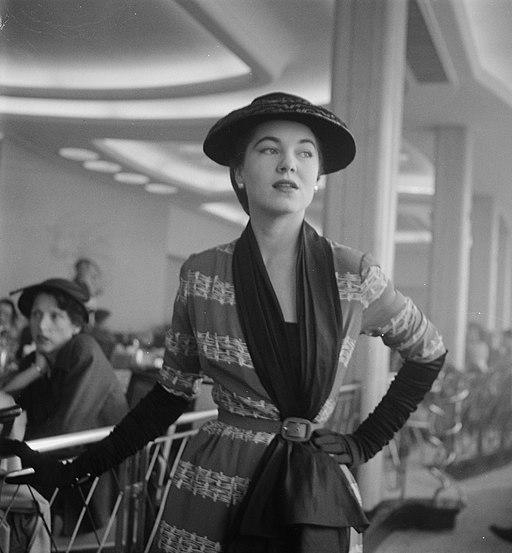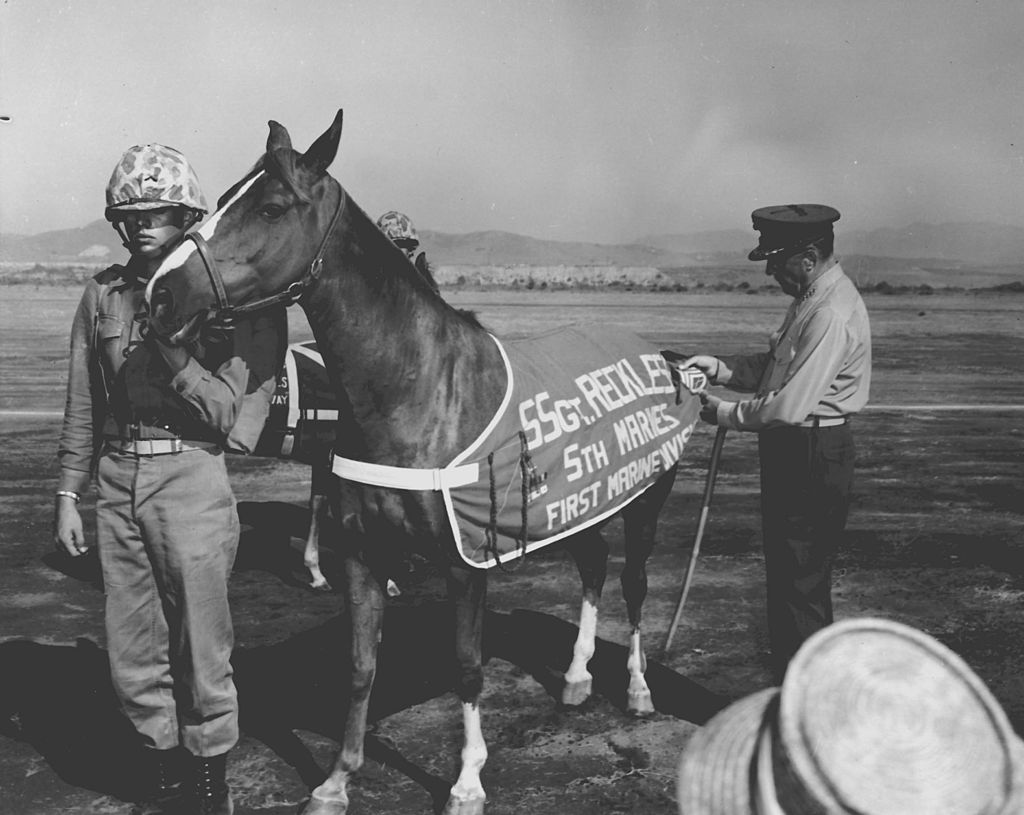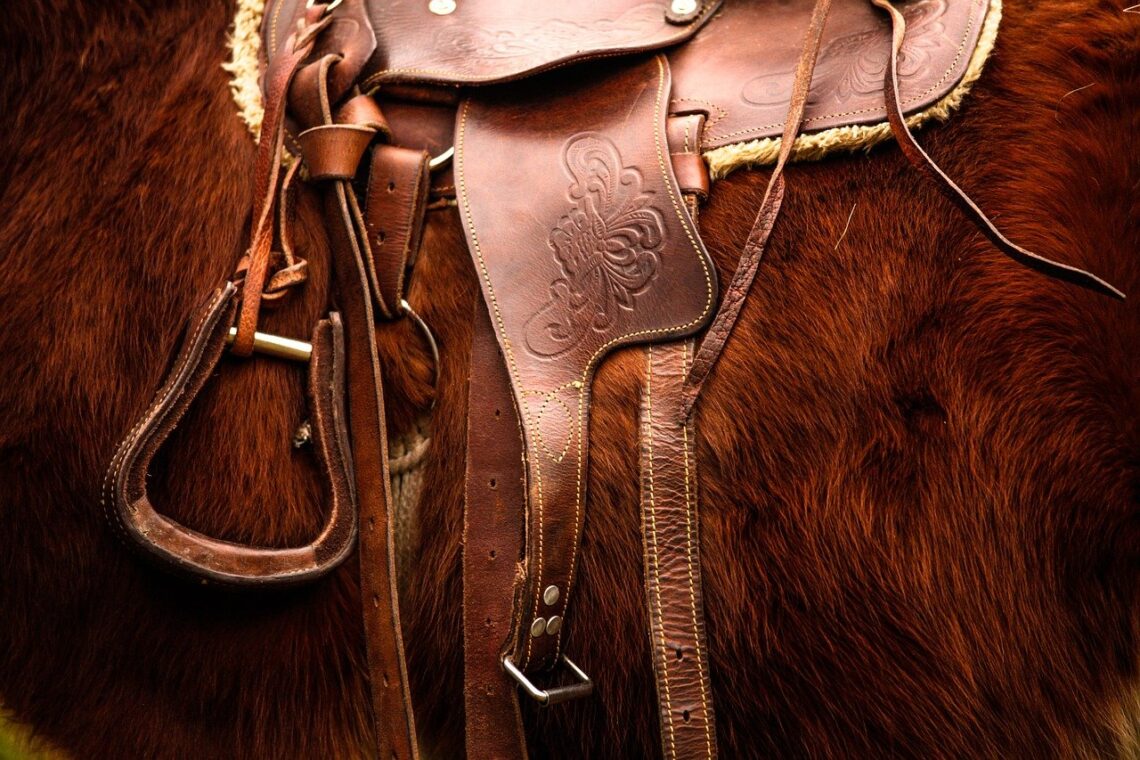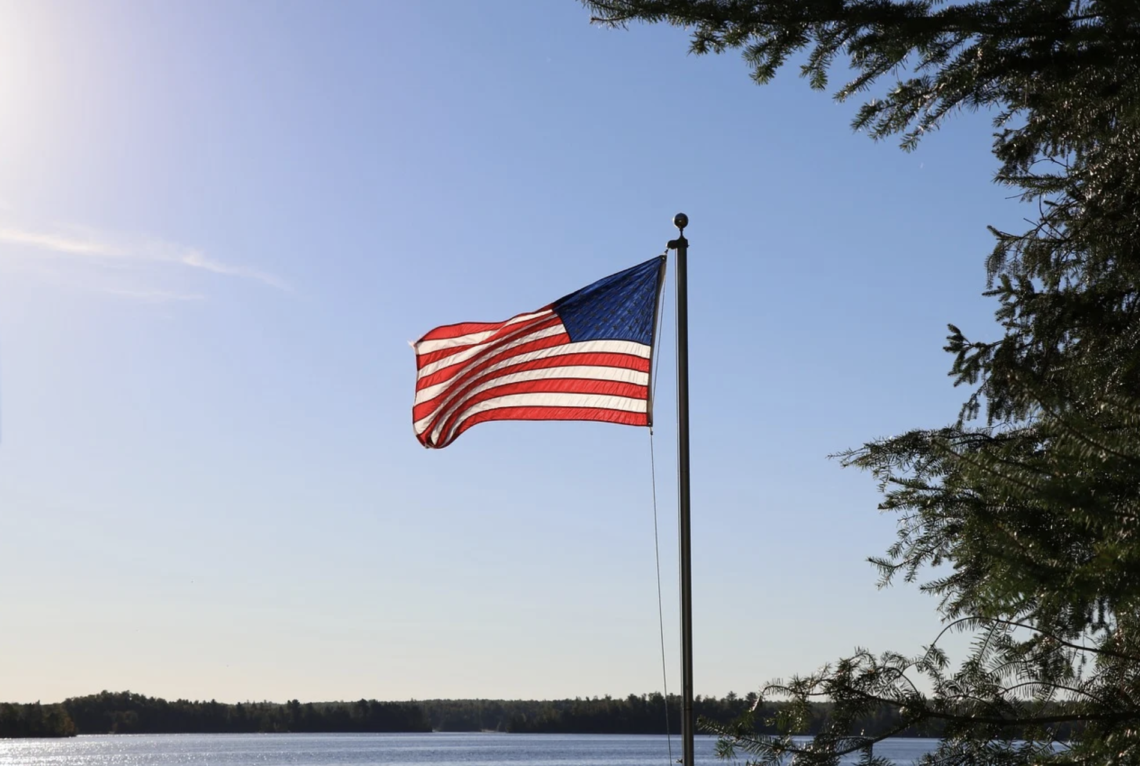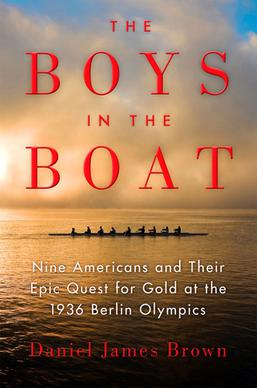-
Dress Impeccably
“Dress shabbily and they remember the dress; dress impeccably and they remember the woman.”
– Coco Chanel
-
Sgt. Reckless: America’s War Horse
By Robin Hutton (2014)
She rose from humble beginnings as a would-be Korean racehorse to the distinction of American war heroine. Purchased in 1952 by the 5th Marine Regiment to transport the Recoilless Rifle Platoon’s 24-pound shells through Korea’s mountainous terrain, Sgt. Reckless quickly proved herself a fearless beast of burden. But she soon became much more than that. As you learn about Reckless’s battlefield heroics during the Korean War and her legacy after, this book will endear to you the spunky and spirited mare that was more Marine than horse, just like she won her way into the hearts of the men she served alongside.
*Sergeant Reckless being promoted to Staff Sergeant, 1959 (source)
-
Action and Inaction
“It is not necessary for a man to be actively bad in order to make a failure in life; simple inaction will accomplish it. Nature has everywhere written her protest against idleness; everything which ceases to struggle, which remains inactive, rapidly deteriorates. It is the struggle toward an ideal, the constant effort to get higher and further, which develops manhood and character.”
– James Terry White
-
Conscience
“Conscience is the most sacred of all property; other property depending in part on positive law, the exercise of that being a natural and unalienable right. To guard a man’s house as his castle, to pay public and enforce private debts with the most exact faith, can give no title to invade a man’s conscience, which is more sacred than his castle, or to withhold from it that debt of protection for which the public faith is pledged by the very nature and original conditions of the social pact.”
– James Madison
-
Look For Fairies Now
It is astonishing what an effect a child’s early training has upon its whole life. When one reflects upon the subject one is inclined to agree with the noted clergyman who said, “Give me the child for the first seven years of his life and you may have him all the rest of the time.” What a wonderful power mothers have in their hands! They shape the lives of the children today, thru them the lives of the men and women of tomorrow, and thru them the nations and the world.
I see by the papers that one of the suffrage leaders of the state will tour the Ozarks this spring in the interest of woman suffrage, bringing light into the dark places, as it were.
A great many seem to regard the securing of the ballot as the supreme attainment and think that with women allowed to vote, everything good will follow as a matter of course. To my mind the ballot is incidental, only a small thing in the work that is before the women of the nation. If politics are not what they should be, if there is graft in places of trust and if there are unjust laws, the men who are responsible are largely what their mothers have made them and their wives usually have finished the job. Perhaps that sounds as if I were claiming for the women a great deal of influence, but trace out a few instances for yourself, without being deceived by appearances, and see if you do not agree with me.
A young friend with whom I talked the other day said that life was so “much more interesting” to her since she “began to look below the surface of things and see what was beneath.” There are deeps beyond deeps in the life of this wonderful world of ours. Let’s help the children to see them instead of letting them grow up like the man of whom the poet wrote,
A primrose by the river’s brim
A yellow primrose was to him and nothing more.Let’s train them, instead, to find “books in the running brooks, sermons in stones and good in everything.”*
– Laura Ingalls Wilder,
excerpt from “Look for Fairies Now” (April 5, 1916)***William Shakespeare, As You Like It, 2.1
**Taken from Laura Ingalls Wilder, Farm Journalist: Writings from the Ozarks -
Courage
“Courage is being scared to death, but saddling up anyway.”
– John Wayne
-
A Perfect Equality
“A perfect equality will indeed be produced; that is to say, equal want, equal wretchedness, equal beggary, and on the part of the partitioners, a woeful, helpless, and desperate disappointment. Such is the event of all compulsory equalizations. They pull down what is above. They never raise what is below: and they depress high and low together beneath the level of what was originally the lowest.”
– Edmund Burke
-
Independence Day 2021
O beautiful for spacious skies,
For amber waves of grain,
For purple mountain majesties
Above the fruited plain!
America! America!
God shed His grace on thee
And crown thy good with brotherhood
From sea to shining sea!O beautiful for pilgrim feet,
Whose stern, impassioned stress
A thoroughfare for freedom beat
Across the wilderness!
America! America!
God mend thine every flaw,
Confirm thy soul in self-control,
Thy liberty in law!O beautiful for heroes proved
In liberating strife,
Who more than self their country loved,
And mercy more than life!
America! America!
May God thy gold refine,
Till all success be nobleness
And every gain divine!O beautiful for patriot dream
That sees beyond the years
Thine alabaster cities gleam
Undimmed by human tears!
America! America!
God shed His grace on thee,
And crown thy good with brotherhood
From sea to shining sea!– Katharine Lee Bates
-
Religion and Morality
“Religion and morality are indispensable supports for our political prosperity.”
– George Washington
-
The Boys in the Boat
By Daniel James Brown (2014)
The year is 1936; the day, August 14th. On the Olympic regatta course in Hitler’s Berlin, nine American crewmen sit tense and ready in their boat, nervously anticipating the signal that will launch them on the race of their lives. Little do they know that even with all odds against them, they are about to make history…
As America struggled to her feet following the 1929 stock market crash, members of the University of Washington’s crew teams scrimped and saved to make ends meet. After all, if they couldn’t pay for tuition, there would be no seats for them in any of the UW boats, even if they were the best rowers. Many came from families that logged, farmed, or fished; the boys’ upbringings built in them quite literally the back and brawn needed to compete with and surpass long-standing university rivals on both coasts. They weren’t afraid to work and train as hard as possible–and neither was their coach. Experimenting by placing and re-placing different boys in different boats was a befuddling and painstaking process for all involved, but when the final pick for varsity was at last settled upon, even critics admitted they had never seen anything quite like it before.
Embark on a fascinating and inspiring journey from the poverty of the Great Depression to the prospect of Olympic gold. Delve into the history of crew as a sport, the science behind constructing a waterworthy shell, and the minuscule technical nuances that can make or break a winning team. Along the way you will also get to know Joe Rantz and the other “boys in the boat” as you experience with them each and every grueling workout, nail-bitingly close race, disheartening defeat, and breathtaking victory.
If you have already read The Boys in the Boat, don’t miss its accompanying documentary, The Boys of ’36, which includes exclusive footage leading up to and during the 1936 Olympic Games. It is available for purchase here, or enjoy a free preview here.
